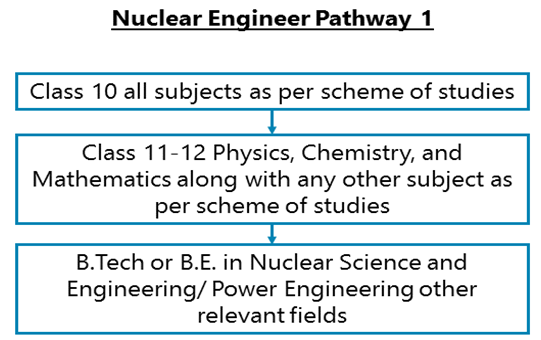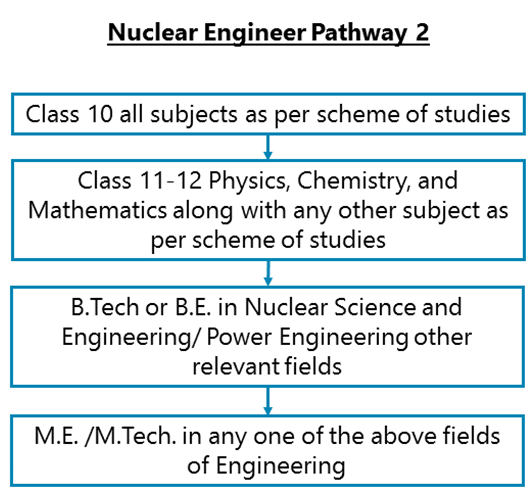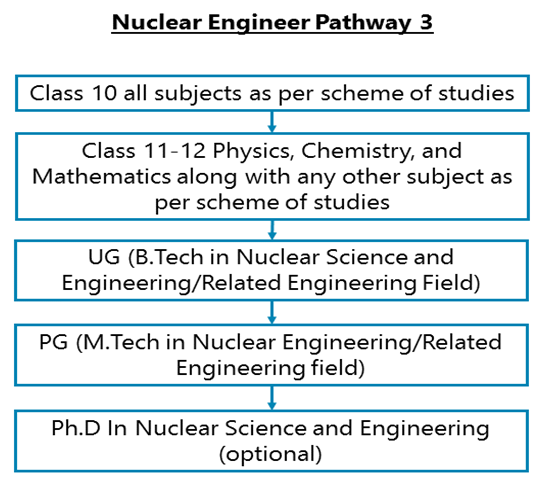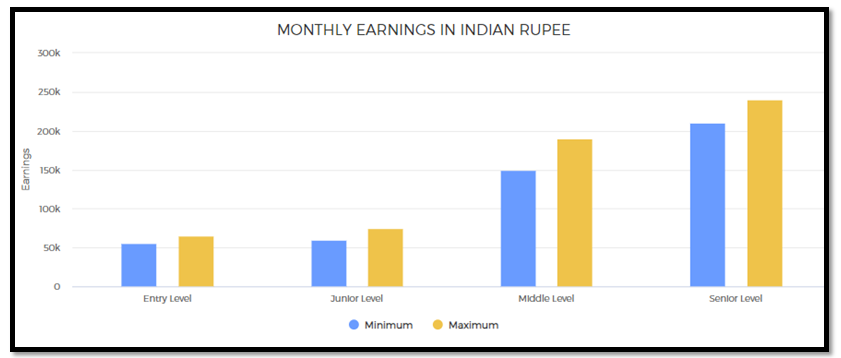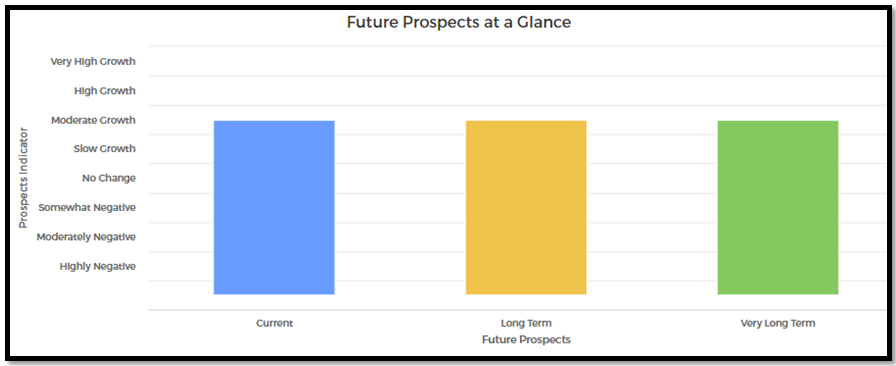Nuclear Engineer
Entry Level Qualification
12
Career Fields
Engineering & Technology
For Specially Abled

Career Entrance Exam
About Career
PARTICULARS | DESCRIPTION |
Name | Nuclear Engineer |
Purpose | Research and Development |
Career Field | Engineering & Technology |
Required Entrance Exam | JEE MAIN BE/BTECH, JEE ADVANCED |
Average Salary | 650000 - 800000 Rs. Per Year |
Companies For You | Nuclear Power Corporation of India Limited (NPCIL), Bhabha Atomic Research Centre (BARC) & Many More |
Who is Eligible | Class 12th Pass |
In the modern world, many countries are moving towards Nuclear energy and trying to use it to generate electricity. As a Nuclear Engineer, you have to design and build the different infrastructure, plant, plant machinery, equipment, and devices that are used in a Nuclear power plant, like nuclear reactors and the cooling system. You will also have to monitor the safety measures present in a plant so as to ensure that there can be no possibility of health risks. Since Nuclear engineers work with radioactive materials, they need to comply with the standard safety procedures. Along with designing, Nuclear engineers can also do maintenance work and make sure that coolers, boilers, reactors and other components in the plant are in working order. If you are a Nuclear Engineer who is engaged in research, you can also develop new methods to increase the efficiency of power plants.
Key roles and responsibilities:
Every Nuclear engineer has to perform these basic tasks which include:
1. Perform engineering and scientific work to use and generate Nuclear energy through Nuclear fission process; design power plants and machienery, etc.
2. Oversee the Nuclear energy production process and make necessary recommendations with regard to the safety and sustainability of nuclear energy production.
3. Staying updated regarding the latest development in Nuclear technology and Nuclear fuel cycles and upgrading the existing system on the basis of the knowledge.
4. Assess the technical and non-technical aspects of Nuclear process so as to generate energy through proper data analysis and interpreting the same.
5. Identify, analyze and then resolve complex technical issues related to Nuclear energy production.
6. Facilitating new levels in the research and development field so as to optimize Nuclear power generation and then, review the R&D projects in accordance with the required initiatives.
7. Preparing certain technical documents as per the existing quality assurance procedures and then compiling the results for submission to internal and external experts.
8. Evaluating the fuel cycles of plutonium, thorium, and uranium, and performing their comparative efficacy in the Nuclear reactors.
9. Developing advanced reactor modeling and design, spent fuel and source terms characterization and lattice physics methods through analysis and research.
10. Coordinating with various manufacturers, vendors, and other Nuclear energy industry personnel to analyze and take corrective measures with any system problems.
11. Evaluating all the functional strategies and assess the cost, requirement of time and resources so as to generate Nuclear energy in a more sustainable environment.
12. Reviewing and analyzing the plant operation parameters as set by the regulatory bodies and establishing the energy production standards in a facility as per the operating guidelines provided.
Career Entry Pathway
Class 10 with any subjects, Science and Mathematics - Class 11-12 in Science stream with Physics, Chemistry, Mathematics - UG (B.Tech or B.E. in Nuclear Science and Engineering/ Power Engineering other relevant fields)
Once you’ve completed your secondary level studies, you can pursue your higher secondary studies in Science stream with Physics and Chemistry being your main subjects and Maths. Then, you can get admission for B.Tech or B.E. in Nuclear Science and Engineering/ Power Engineering other relevant fields.
Class 10 all subjects as per scheme of studies – Class 11-12 Physics, Chemistry, and Mathematics along with any other subject as per scheme of studies - UG (B.Tech or B.E. in Nuclear Science and Engineering/ Power Engineering other relevant fields) - PG (M.E. or M.Tech in Nuclear Science and Engineering/ Power Engineering other relevant fields)
Once you’ve completed your Class 11-12 Physics, Chemistry, and Mathematics along with any other subject as per scheme of studies. Then, you can get admission for B.Tech or B.E. in Nuclear Science and Engineering/ Power Engineering other relevant fields followed by an M.E. /M.Tech. in any one of the above fields of Engineering.
Class 10 all subjects as per scheme of studies – Class 11-12 Physics, Chemistry, and Mathematics along with any other subject as per scheme of studies - UG (B.Tech in Nuclear Science and Engineering/Related Engineering Field) - PG (M.Tech in Nuclear Engineering/Related Engineering field)-Ph.D In Nuclear Science and Engineering
Once you’ve completed your Class 11-12 Physics, Chemistry, and Mathematics along with any other subject as per scheme of studies. You can then pursue B.Tech in Nuclear Science and Engineering/Related Engineering Field. Then, you can move on to postgraduate degrees like M.Tech in Nuclear Science and Engineering/related engineering field and choose your specialization. After that, you can go for a doctoral degree so that you can be introduced to experimental techniques, independent application of research, and advanced research in areas like radiological engineering, medical physics and nuclear power engineering.
Required Qualification & Competencies
Undergraduate studies after school:
If you want to be a Nuclear Engineer, you need to have a Graduate degree in any of the following studies:
Nuclear Science and Engineering / Power Engineering and other relevant fields
This will make you eligible to join as a Graduate Engineering Trainee in any company.
Post Graduate studies:
If you are interested to get better jobs and move up fast, then you need to have Post Graduate Degree in any of the following fields of study:
Nuclear Science and Engineering / Power Engineering and other relevant fields.
Doctoral Studies:
A Doctorate Degree in Nuclear Science and Engineering is the highest degree in the field of study. It is necessary to have a master’s degree before you can go for a Doctorate degree in Nuclear Science and Engineering. The Doctoral Degree will make you eligible to as a Post Doctoral Feloow, and also open up fields for education such as Professor of Nuclear Engineering.
MINIMUM EDUCATION REQUIRED | MAXIMUM EDUCATION REQUIRED |
Under Graduate | Doctoral |
COMPETENCIES REQUIRED
Occupational Interests:
1. Investigative: Investigative occupations require working with a lot of ideas and hence, it requires a lot of thinking as well. It may require searching for new information, facts, and figures.
2. Realistic: A person should be realistic and practical in their work approach and conduct the work with realistic problem-solving skills.
3. Conventional: Conventional occupations require a clear line of rules and regulations to be followed. Generally, it deals with more data and as a result, a line of authority needs to be followed.
Knowledge
1. Engineering and Technology: Knowledge of various applications of one or more branches of Engineering Science & Technology to manufacture and produce various goods or construct or erect various structures. This include knowledge about design, development, prototype testing, manufacturing, construction, installation, repair and maintenance.
2. Mathematics: Knowledge of arithmetic, algebra, geometry, calculus, trigonometry, statistics, and other mathematical disciplines and their applications.
Skills
1. Active Learning: Focused and continuous learning from various sources of information, observation and otherwise for application in getting work done.
2. Coordination: Skills in working together with other people to get things done.
3. Judgment and Decision Making: Skills in considering pros and cons of various decision alternatives; considering costs and benefits; taking appropriate and suitable decisions.
4. Operations and Process Analysis: Skills in analysis of operations and processes such as industrial manufacturing, chemical processing, etc. so as to device better and more efficient operational processes and systems.
5. Problem Solving: Skills in analysis and understanding of problems, evaluating various options to solve the problems and using the best option to solve the problems.
6. Supervising: Skills in Supervising and monitoring performance of others, businesses, and different projects.
7. Troubleshooting: Skills in determining causes of operating errors and deciding what to do about it.
8. Technical: Skills in using various technologies and technical methods to get things done or solve problems.
Abilities
1. Abstract Reasoning: The ability to understand ideas which are not expressed in words or numbers; the ability to understand concepts which are not clearly expressed verbally or otherwise.
2. Inductive Reasoning: The ability to combine pieces of information from various sources, concepts, and theories to form general rules or conclusions. For example, analysing various events or situations to come out with a set of rules or conclusions.
3. Inter-Personal: The ability to build and maintain good relationships with others at workplaces and elsewhere.
4. Numerical Reasoning: The ability to add, subtract, multiply, divide, and perform other basic numerical calculations correctly.
5. Speed of Closure: The ability to quickly make sense of, combine, and organize information into meaningful patterns.
6. Verbal Reasoning: The ability to think and reason with words; the ability to reason out ideas expressed in words.
Personality
1. You are always or mostly organised in your day-to-day life and activities.
2. You always feel secure in your surroundings and in most situations.
3. You are imaginative sometimes.
4. You prefer to experience new things and have new experiences sometimes.
5. You act independently sometimes but do not do so in some other times.
6. You are friendly and outgoing sometimes, but not always.
7. You prefer company of people sometimes but not always.
8. You are always practical or in most situations.
Career - Job Opportunities & Profiles
Nuclear engineers can find a job in Nuclear factories and power plants. As a graduate, you will enter in a company as a Graduate Engineering Trainee:
If you progress further and get a postgraduate degree, then you take up any of these positions:
1. Process Engineer
2. Plant Engineer
3. Junior Project Engineer
4. Junior Quality Engineer
Work Environment
Nuclear Engineers generally need to work in offices. However, their workplace varies according to the industry or department that they are working in. You can be employed in power stations or in the supply work in Nuclear power plants. You may work in consultancy firms or research areas. They generally work indoors, and as they are often exposed to radiation, they must wear safety attire. As a Nuclear engineer, you are expected to work alongside with electrical engineers and mechanical engineers so as to collaborate and successfully incorporate designs. Nuclear engineers generally have to work full time, that is, 40 hours a week.
SPECIALISATION TRACKS IN THIS CAREER
1. Modeling and Simulation Nuclear Engineers
Modeling and Simulation Nuclear Engineers are those who work with neutron and gamma figures and data.
2. Nuclear Fusion and Plasma Science Nuclear Engineers
Nuclear fusion and Plasma Science nuclear engineers are those who conduct research on plasma processing and fusion reactors.
3. Nuclear Material Engineers
Nuclear Material Engineers study nuclear materials and attempt to reduce the degradation of materials when they are in nuclear reactor plants.
4. Nuclear Reactor Engineers
Nuclear Reactor Engineers are those who conduct advanced design and analysis on nuclear reactors.
5. Medical Instrumentation
Nuclear Engineers are involved in testing and developing different kinds of medical instrumentation. These includes Magnetic Resonance Imaging (MRI) and Positron Emission Tomography (PET Scan). You may also research different kinds of radioactive tracers, such as radiopharmaceuticals, where nuclear medicine is used to diagnose diseases.
CAREER GROWTH
At first, junior Nuclear engineers need to work under the supervision of senior engineers after their B.Tech. In most companies, they will be employed as a Graduate Engineering Trainee where they will receive formal training. With more knowledge and expertise, they can have independence and can handle difficult projects as Assistant Engineer or Senior Engineer.
Salary Offered
As a Nuclear Engineer, you can expect a decent salary. As an entry-level Nuclear engineer, you can expect about Rs. 55,000 to 65,000 per month. A junior level Nuclear engineer can get about Rs. 60,000 to Rs. 75,000 per month. However, based on your experience, your salary will continue to increase. If you have a lot of experience and prove your abilities in the field, your salary can go up to Rs. 2,50,000 per month.
MONTHLY EARNINGS IN INDIAN RUPEE

1. Entry level: 0 - 2 years of work experience
2. Junior Level: From 1 to 12 years of work experience
3. Mid Level: From 5 to 20+ years of work experience
4. Senior Level: From 10 to 25+ years of work experience (there could be exceptions in some high-end technical, financial, engineering, creative, management, sports, and other careers; also in the near future, people will reach these levels much faster in many careers and in some careers, these levels will have no meaning as those careers will be completely tech skill driven such as even now, there is almost no level in a Cyber Security Expert’s job)
Work Activities
As a Nuclear engineer, you have to work in an office and deal with the examination of the reactor core, radiation shielding, and associated instrumentation. You will have to monitor facility operations and make sure that different safety rules are complied with. Here are a few core skills and activities that a Nuclear Engineer must master:
1. Assessing and determining compliance with standards, laws, rules, and guidelines: Using relevant information, auditing information, processes and systems to determine whether organizations or people are complying with standards, laws, rules, and guidelines.
2. Communicating with co-workers and others: Communicating with people in writing, verbally or otherwise inside your workplace and various other people who have professional relationships with your place of work including vendors, government officials, etc. or with people at large.
3. Working in a team: Working in a team of people; developing a team; maintaining professional relationships among team members.
4. Inspecting equipment, systems, structures, and materials: Inspecting equipment, systems, structures, and materials to ascertain quality, performance, defects, causes of errors, etc.
5. Organizing, planning and prioritizing tasks: Planning and organizing tasks in order to achieve work goals; prioritizing tasks to achieve goals and making the best use of the time available.
Future Prospects
In India, there is a projected rise in energy consumption by 129% between the years 2015 and 2035. As a result, the government has planned for a total installed capacity of 700 GWe of Nuclear power to meet 7-9% GDP growth aiming for 63 GWe Nuclear by 2032. Plus, the government plans to use Nuclear energy to generate 25% of the electricity by 2050. Hence, there will be adequate future opportunities for Nuclear engineers in the future.
FUTURE PROSPECTS AT A GLANCE


